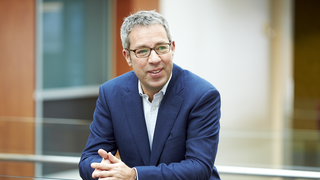- Safety & Recalls
- Regulatory Updates
- Drug Coverage
- COPD
- Cardiovascular
- Obstetrics-Gynecology & Women's Health
- Ophthalmology
- Clinical Pharmacology
- Pediatrics
- Urology
- Pharmacy
- Idiopathic Pulmonary Fibrosis
- Diabetes and Endocrinology
- Allergy, Immunology, and ENT
- Musculoskeletal/Rheumatology
- Respiratory
- Psychiatry and Behavioral Health
- Dermatology
- Oncology
AstraZeneca Presents Positive Results for COVID-19 Monoclonal Antibody, RSV Treatments
Data is being presented at the 10th Annual IDWeek Virtual Conference, September 29 to October 3.
AstraZeneca will present positive data from a phase 3 study of its monoclonal antibody treatment for COVID-19,as well as a new therapy for respiratory syncytial virus (RSV) at the 10th Annual IDWeek Virtual Conference, September 29 to October 3.
AstraZeneca will reveal data showing that its investigational long-acting antibody (LAAB), AZD7442, reduced the risk of developing symptomatic COVID-19 by 77% compared with placebo, AstraZeneca said when originally announcing the results in August.
In addition, there were no cases of severe COVID-19 or COVID-19-related deaths in those treated with AZD7442. In the placebo arm, there were three cases of severe COVID-19, including two deaths.
AZD7442 was well-tolerated and preliminary analyses show adverse events were balanced between the placebo and AZD7442 groups.
AZD7442 is being studied in a clinical trial program for both prevention and treatment of COVID-19, and AstraZeneca is preparing to obtain emergency use authorization from health regulators, AstraZeneca said in a news release.
AZD7442, a combination of two LAABs, tixagevimab (AZD8895) and cilgavimab (AZD1061), is derived from B-cells donated by convalescent patients after infection with the SARS-CoV-2 virus.
The medication’s half-life extension “more than triples” the durability of its action compared with conventional antibodies and could afford up to 12 months of protection from COVID-19 following a single administration, AstraZeneca said.
Meanwhile, the phase 3 trial for nirsevimab, an investigational long-acting antibody being developed by AstraZeneca and Sanofi, demonstrates the potential of nirsevimab to help protect all infants entering their first RSV season.
There has been a recent resurgence of RSV during the easing of COVID-19 public health measures, AstraZeneca noted.
Nirsevimab, which has been granted breakthrough therapy designation from the FDA, is designed to provide RSV protection to all infants via an antibody given directly to an infant to help prevent lower respiratory tract infections caused by RSV. “Unlike an active immunization, monoclonal antibodies do not require the activation of the immune system to help offer rapid and direct protection against disease,” AstraZeneca said.
The current anti-RSV antibody, AstraZeneca’s Synagis (palivizumab), is limited to high-risk infants and provides one-month protection, and requires five injections to cover an RSV season, according to AstraZeneca.
Mene Pangalos

“The compelling data being presented at IDWeek reflect our scientific advances across infectious diseases in response to the COVID-19 pandemic and surges in respiratory syncytial virus cases,” said Mene Pangalos, executive vice president of BioPharmaceuticals R&D at AstraZeneca. “Our PROVENT phase 3 data demonstrate AZD7442 may offer much-needed protection for vulnerable populations who may not mount an adequate immune response to COVID-19 vaccination.”
Timothy Grass Pollen Allergen Extract approved by FDA
April 16th 2014FDA has approved the Timothy Grass Pollen Allergen Extract (Grastek, Merck) sublingual tablet as immunotherapy to treat grass pollen-induced allergic rhinitis with or without conjunctivitis in children as young as 5 years of age and adults up to the age of 65. The tablet is a new option for patients who decline allergy shots.
Sublingual immunotherapy for allergic rhinitis and asthma effective, JAMA reports
April 2nd 2013In an examination of a type of treatment for allergic rhinitis and asthma that is used in Europe but not approved by FDA, researchers found moderate strength in the evidence from previous studies to support the use of sublingual immunotherapy for the treatment of these conditions, according to a review article in the March 27 issue of JAMA.
Leukotriene inhibitors associated with neuropsychiatric events
September 14th 2009In an update to an earlier communication, FDA announced that the manufacturers of the leukotriene inhibitors montelukast (Singular), zafirlukast (Accolate), zileuton (Zyflo), and zileuton extended-release (Zyflo CR) are adding information about neuropsychiatric events to product labeling.
